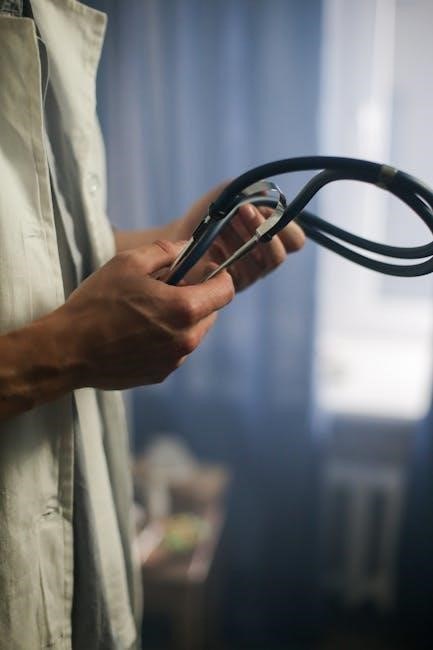
nurse practitioner interview questions and answers pdf
Nurse Practitioner interviews often include a mix of behavioral‚ clinical‚ and situational questions. This guide provides insights and sample answers to help candidates prepare effectively.
Overview of the Importance of Preparation
Preparation is crucial for acing nurse practitioner interviews‚ as it demonstrates professionalism and readiness. Researching the employer and role helps tailor responses to align with their values. Practicing answers to common questions‚ such as behavioral and clinical scenarios‚ builds confidence and clarity. Understanding the job description and requirements ensures candidates can highlight relevant skills. Preparation also involves reviewing one’s education‚ certifications‚ and clinical experiences to provide specific examples. Additionally‚ anticipating tough questions and developing thoughtful responses showcases problem-solving abilities. A well-prepared candidate is more likely to make a positive impression‚ demonstrating their commitment to the role and organization.
Common Nurse Practitioner Interview Questions
Nurse Practitioner interviews often include questions about clinical expertise‚ patient care scenarios‚ and professional experiences. Examples include discussing diagnostic processes‚ managing complex cases‚ and collaborating with healthcare teams.
Behavioral Interview Questions
Behavioral questions in Nurse Practitioner interviews focus on past experiences to predict future performance. Common examples include: “Tell me about a challenging patient case you managed‚” “Describe a time you collaborated with a healthcare team‚” and “How do you handle conflicts with colleagues?” These questions assess communication‚ problem-solving‚ and interpersonal skills. Employers seek candidates who demonstrate empathy‚ leadership‚ and adaptability. Preparing specific‚ detailed anecdotes using the STAR method (Situation‚ Task‚ Action‚ Result) is essential. Highlighting how you navigated complex situations and contributed positively to patient outcomes will showcase your suitability for the role. Practicing these responses ensures confidence and clarity during the interview.
Clinical and Patient-Care Related Questions
Clinical and patient-care questions assess a Nurse Practitioner’s medical expertise and decision-making skills. Examples include: “What steps would you take to diagnose and manage a patient with symptoms of heart failure?” or “How do you handle a patient with a rare condition?” These questions evaluate knowledge of evidence-based practices‚ diagnostic processes‚ and treatment protocols. Candidates should demonstrate familiarity with clinical guidelines and the ability to apply them in real-world scenarios. Highlighting specific cases where you successfully improved patient outcomes can strengthen your responses. It’s crucial to articulate your thought process clearly‚ showing how you prioritize patient safety and individualized care. Detailed‚ confident answers reflect a strong clinical foundation and readiness for advanced practice roles.
Situational and Problem-Solving Questions
Situational and problem-solving questions evaluate how Nurse Practitioners handle challenging scenarios. Examples include: “Describe a time you had to make a quick decision with limited information‚” or “How would you manage a difficult patient?” These questions assess critical thinking‚ resourcefulness‚ and ethical judgment. Candidates should use the STAR method (Situation‚ Task‚ Action‚ Result) to structure their responses‚ highlighting specific experiences and outcomes. Demonstrating empathy‚ effective communication‚ and a patient-centered approach is key. Employers seek candidates who can navigate complex situations confidently while maintaining professionalism and prioritizing patient well-being. Preparation with real-life examples and practice in articulating clear‚ logical solutions will enhance performance in this area.

Preparing for the Interview
Researching the employer‚ practicing answers to common questions‚ and reviewing clinical scenarios can significantly enhance confidence and readiness for a Nurse Practitioner interview.
Researching the Employer and Role
Researching the employer and role is crucial for a successful Nurse Practitioner interview. Understanding the organization’s mission‚ values‚ and patient-care philosophy helps align your answers with their goals. Reviewing the job description and requirements ensures you can speak to how your skills and experiences meet their needs. Familiarizing yourself with their services‚ patient demographics‚ and any recent achievements or challenges can also provide valuable talking points. Additionally‚ understanding the specific responsibilities of the role allows you to tailor your examples and highlight relevant accomplishments; This preparation demonstrates your enthusiasm and readiness to contribute effectively‚ making a strong impression during the interview.
Practicing Answers to Frequently Asked Questions

Practicing answers to frequently asked Nurse Practitioner interview questions is essential for confidence and clarity. Reviewing common questions‚ such as “Why did you choose to become a Nurse Practitioner?” or “How do you handle difficult patients?” allows you to craft thoughtful responses. Using the STAR method (Situation‚ Task‚ Action‚ Result) to structure your answers helps provide clear and concise examples. Recording yourself or conducting mock interviews with peers can further refine your delivery. Additionally‚ staying updated on industry trends and current healthcare issues ensures you are prepared for topical discussions. Regular practice helps you articulate your skills‚ experiences‚ and goals effectively‚ making a positive and professional impression during the interview.

During the Interview
Stay engaged‚ maintain eye contact‚ and use the STAR method to structure your answers. Show enthusiasm‚ professionalism‚ and a genuine passion for the Nurse Practitioner role.
Making a Strong First Impression
Making a strong first impression is crucial during a Nurse Practitioner interview. Professional attire‚ punctuality‚ and a confident demeanor set the tone for the conversation. Ensure your outfit is clean‚ modest‚ and aligns with the workplace culture. Arrive early to demonstrate responsibility and respect for the interviewer’s time. A firm handshake‚ maintaining eye contact‚ and a warm smile can instantly create a positive impression. Be prepared to articulate your introduction clearly‚ highlighting your qualifications and passion for the role. Non-verbal cues‚ such as posture and gestures‚ also play a significant role in showcasing your confidence and professionalism. A well-prepared opening statement can help you stand out and demonstrate your enthusiasm for the position.
How to Handle Tough or Unexpected Questions
Handling tough or unexpected questions requires confidence and composure. Pause briefly to collect your thoughts before responding. Use the STAR method (Situation‚ Task‚ Action‚ Result) to structure your answers clearly. Acknowledge the challenge and demonstrate problem-solving skills. For ethical dilemmas‚ emphasize patient-centered care and adherence to professional standards. If unsure‚ ask for clarification to ensure understanding. Show honesty and humility‚ admitting when you need more information or experience. Highlight your ability to seek guidance and learn from others. Maintain a positive tone‚ focusing on growth and teamwork. Avoid defensive or dismissive responses‚ and always tie your answer back to your commitment to patient care and professional development.

After the Interview
After the interview‚ send a thank-you note to express gratitude and reaffirm interest. Follow up politely if you haven’t received feedback within the expected timeframe.
Writing a Thank-You Note
A thank-you note after a nurse practitioner interview is crucial for making a lasting impression. It should be personalized‚ professional‚ and sent within 24 hours. Express gratitude for the opportunity‚ highlight key points discussed during the interview‚ and reaffirm your interest in the role. Mention specific topics that resonated with you‚ such as aligning with the organization’s mission or discussing patient care approaches. Keep the tone sincere and concise‚ ensuring proper grammar and formatting. This gesture not only shows appreciation but also demonstrates your commitment and enthusiasm for the position. Many candidates overlook this step‚ so it can help you stand out. A well-crafted thank-you note can leave a positive impression and reinforce your candidacy.
Negotiating the Job Offer
Negotiating a job offer as a nurse practitioner requires confidence and professionalism. Research the market standards for your role to ensure fair compensation. Consider factors like salary‚ benefits‚ bonuses‚ and paid time off. Professional development opportunities‚ such as tuition reimbursement or conference funding‚ are also valuable to negotiate. Be clear about your expectations but remain flexible and open to compromise. Express enthusiasm for the role while advocating for your needs. Avoid demanding tone and frame requests as collaborative discussions. For example‚ ask about flexibility in start dates or remote work options if important to you. Once agreed‚ ensure all terms are documented in the final contract. Negotiation demonstrates your professionalism and sets a positive tone for your employment.
Preparing for nurse practitioner interview questions is crucial for success. Research the role‚ practice answers‚ and understand the employer’s values. Be ready for behavioral‚ clinical‚ and situational questions. Confidence and professionalism are key. Highlight your skills‚ experience‚ and passion for patient care. Show enthusiasm for the role and align your goals with the organization’s mission. Stay positive‚ and remember‚ the interview is a two-way conversation. Follow up with a thank-you note and negotiate terms confidently. With thorough preparation and a proactive mindset‚ you’ll stand out as a strong candidate. Good luck‚ and may your hard work lead to securing the position!
Related Posts

five rites of rejuvenation pdf
Discover the ancient Tibetan secrets to a younger, healthier you! Download the ‘5 Rites of Rejuvenation’ PDF and start your journey to incredible energy & well-being today. ✨

the clean house by sarah ruhl pdf
Download Sarah Ruhl’s ‘The Clean House’ in PDF format! Explore this Pulitzer Prize finalist – a quirky, funny, and deeply moving play about love, loss, and cleaning. Get your copy now!

fifty shades of grey book free pdf
Dive back into the passionate world of Christian Grey! Download the *Fifty Shades Freed* PDF now and experience the thrilling conclusion. Free & easy access!